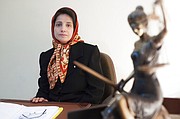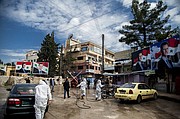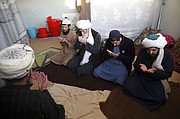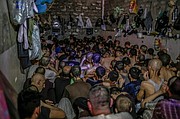Crammed in filthy cells, political prisoners fear infection
CAIRO (AP) — Reza Khandan got the word from friends locked away in Iran’s most feared prison, Evin. A prisoner and a guard in their cell block had been removed because they were suspected of having coronavirus, and two guards in the women’s ward had shown symptoms.
It was frightening news. Khandan’s wife, Nasrin Sotoudeh, one of Iran’s most prominent human rights lawyers, is imprisoned in that ward in close quarters with 20 other women. Only days earlier, the 56-year-old Sotoudeh — known for defending activists, opposition politicians and women prosecuted for removing their headscarves — had held a five-day hunger strike demanding prisoners be released to protect them from the virus.
“The virus has entered the jail, but we don't know the extent of it,” Khandan, who had until recently been imprisoned in Evin as well, told The Associated Press by phone from Tehran.
"It will be impossible to control," Khandan warned.
Tens of thousands of political prisoners are jailed in Iran, Syria and other countries around the Middle East, punished for anything from advocating for democracy and promoting women’s or workers’ rights to holding Islamist views, protesting or simply criticizing autocratic leaders on Facebook or YouTube.
Alarm is growing over the danger the coronavirus pandemic poses to prisoners: if one guard, visitor or new inmate introduces the infection, the virus could race rampant through a captive population unable to protect itself.
Conditions are prime for the disease to spread rapidly. Inmates are often packed by the dozens into dirty cells with no access to hygiene or medical care. Torture, poor nutrition and other abuses leave prisoners weaker and more vulnerable.
So far, Iran, which faces the Mideast’s biggest outbreak with thousands infected and hundreds dead, has not confirmed any coronavirus cases in its prisons. But Khandan’s is one of several reports of cases that have emerged from Iranian facilities. Egypt and Syria, which have large numbers of political detainees, also have not reported any cases within prisons.
The concern over prisons is worldwide. Multiple countries — including Iran — have released some inmates to reduce crowding. Others say they are sterilizing cells, halting family visits or increasing monitoring of guards and staff. Riots have broken out in prisons in several countries among inmates fearful not enough is being done.
In authoritarian nations, ensuring protections for detainees is even more difficult. Activists, rights organizations and aid groups have grown bolder in pressing governments in the area to take action. Amnesty International called on Iran to free more prisoners, particularly rights defenders and peaceful protesters.
“They should not be in detention in the first place,” it said.
Egypt last week briefly detained four women — including three relatives of a prominent jailed activist — who called for prisoner releases. Mohsen Bahnasi, an Egyptian lawyer who also called for prisoner releases, was arrested from his home, though it was not clear why, according to the Arab Network for Human Rights Information.
The International Committee of the Red Cross — one of the few organizations that sometimes gets access to prisons in the region — is stepping up efforts to help.
“We must act now to try to prevent it from entering places of detention. Trying to contain it after the fact will be almost impossible,” said Fabrizio Carboni, the ICRC’s Near and Middle East regional director.
He said the ICRC has already begun distributing soap, disinfectant and protective equipment at prisons in several places in the Mideast. It has requested permission from Syria to do the same in its facilities and is hopeful it will get access, he said.
Syria is the darkest black hole in the region. In the long civil war, tens of thousands of activists, protesters and others have been swallowed with hardly a trace into prisons run by President Bashar Assad’s government.
Syria has confirmed nine cases of coronavirus and one death, none of them in its prisons.
If coronavirus were spreading within prison walls, it’s doubtful the outside world would find out, said Dr. Amani Ballour, who previously ran a hospital in a rebel-held enclave near the Syrian capital, Damascus.
“The regime doesn’t care,” she said. “If there is (an outbreak), they won’t declare it because they’re killing detainees anyway — or trying to.” Ballour has searched in vain for her brother and brother-in-law in Syrian prisons for nine years. “I don’t imagine anyone surviving the regime prisons,” she said.
Conditions inside are perhaps the most terrifying in the region. Rights groups and former detainees describe Syria's detention facilities as slaughterhouses where detainees undergo constant torture, including beatings, burnings, electric shocks, mutilations and rapes. Authorities almost never confirm arrests, and detainees are kept incommunicado out of the regular prison system.
As many as 50 people are locked in a 4-by-6-meter cell for weeks, month and years — sleeping on top of each other, almost never allowed to bathe, given meager and rotten food and dirty water. Amnesty International estimated 17,723 people were killed in custody across Syria between 2011 and 2015, with the actual number likely higher. There’s no reason to believe conditions have changed since, said Amnesty’s Lynn Maalouf.
There is a “deliberate policy of letting people die of illness,” said Mohammad al-Abdallah, head of the Washington-based Syria Justice and Accountability Center. The overcrowded, dirty cells are “exactly the formula a disease like corona needs to grow,” he said.
The U.S. State Department last week warned that an outbreak in the Syria’s prison would “have devastating impact” and demanded Damascus free all arbitrarily detained civilians — including Americans.
Among the detained Americans is Majd Kamalmaz, who vanished a day after entering Syria in February 2017 to visit family for the first time in six years. A 62-year-old clinical psychologist from Virginia, he was not involved in politics and was engaged in international humanitarian work.
“To this day we don’t know why they detained him,” his daughter Maryam said.
At her home outside Dallas, Texas, Maryam’s family are taking all precautions against the pandemic: she and her children haven’t left the house for days and her husband goes out only to get groceries. She worries about her mother, alone in an apartment nearby. Majd’s disappearance “truly affected her health and she gets sick very easily now,” Maryam said.
“We are very, very concerned” that her father could contract coronavirus, she said. He is diabetic and had a stroke and a heart attack.
In January, a contact in Syria told the family that Kamalmaz had been moved from his prison, but they have no idea why or where to. He may have been put under closer observation amid pressure by American and European officials for his release.
“We know that the Syrian regime doesn’t care much about human life and the idea of them saying oh yes he might have passed with the coronavirus and not really caring much is very worrisome to us,” Maryam said.
In Iran, authorities say they have temporarily freed some 100,000 inmates — around half the prison population, in a sign of their alarm at the outbreak.
But hundreds of prisoners of conscience and other dissidents remain imprisoned, Amnesty said. It said there have been multiple reports of coronavirus cases within Iran’s prisons, including two deaths, though the government has not confirmed any.
Siamak Namazi, an Iranian-American businessman who was not among those released, has reported “multiple cases on his hallway” in Evin Prison, his Washington-based lawyer, Jared Genser, has said.
One furloughed prisoner, Babak Safari, said in an online video that immediately after leaving prison he began having fevers, chills and difficulty breathing and had to be hospitalized. He said he was certain he contracted coronavirus in prison.
“All the political prisoners being held in Tehran prison are in great danger. Save them,” Safari said.
In some places, prisoners appear to be lashing out in fear of the virus. Italy, Colombia and Jordan have all seen riots by inmates complaining of insufficient protections, and a string of prison riots has broken out in Iran. Palestinians in Israeli prisons have threatened hunger strikes after one guard tested positive.
In eastern Syria, Islamic State group militants rioted in a prison run by U.S.-backed Kurdish fighters. A spokesman for Kurdish-led forces, Mustafa Bali, said there did not appear to be a connection to coronavirus fears. But overcrowding has plagued the more than two dozen facilities where the Kurds are holding some 10,000 IS militants, including 2,000 foreigners whose home countries have refused to repatriate them.
Afghanistan’s largest prison, Pul-e-Charkhi, was built in the 1970s to house 5,000 prisoners but now holds 10,500.
Keeping a safe distance is impossible “with two persons sleeping together in a one-meter space,” said Naiz Mohammad, one of around 3,000 Taliban in the prison, speaking by telephone from his cell. He said promises of extra soap and disinfectant had not materialized.
“Everyone here is worried. If you see inside the cells, the bars, the locks, everything is all dirty,” he said.
In Egypt, families are desperate for information on loved ones in prisons, where rights groups say overcrowding, abuses and poor hygiene are rampant.
Tens of thousands have been jailed in crackdowns since 2013 that expanded from Islamists to secular democracy advocates and critics of the government. Over that time, the government has built more than a dozen new prisons and it repeatedly has said conditions are humane. In recent weeks, a handful of activists and other prisoners have been released.
But former prisoners have said cells are still often packed tightly. One meme circulating online showed a photo of President Abdel-Fattah el-Sissi sitting 2.5 meters from his ministers — and noted that in the prisons, that space might be filled by 10 detainees. Former president Mohammed Morsi, deposed by el-Sissi in 2013, collapsed in court and subsequently died last year, and his family and lawyers blamed poor conditions and lack of medical care.
Celine Lebrun Shaath said her husband, Palestinian-Egyptian activist Ramy Shaath, is kept in a 25 square meter cell with 18 others, and any illness or scabies passes easily among them. Ramy Shaath, the son of a former Palestinian foreign minister, was detained last summer but has not been charged, and his wife, a French citizen, was deported.
She noted that while visits and deliveries of food or other supplies to prisoners is forbidden, guards and other staff move in and out to their homes and neighborhoods, taking crowded public transportation.
"The doors are open for them. We are worried about the entire system."
___
El Deeb reported from Beirut. Associated Press writers Jon Gambrell in Dubai, United Arab Emirates; Mohammed Daraghmeh in Ramallah, West Bank; Ilan Ben Zion in Jerusalem; Zarar Khan in Islamabad and Tameem Akhgar in Kabul contributed to this report.









